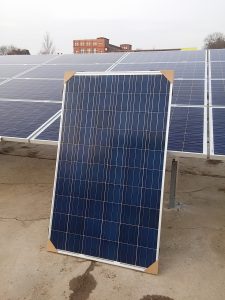 The Department of Toxic Substances Control (DTSC) held a public informational seminar on March 25, 2019 to present draft regulations that would revise California’s Universal Waste Program to include waste photovoltaic modules (PV modules), commonly known as solar panels. The informational session offered the opportunity for public discussion prior to the beginning of the formal rulemaking process.
The Department of Toxic Substances Control (DTSC) held a public informational seminar on March 25, 2019 to present draft regulations that would revise California’s Universal Waste Program to include waste photovoltaic modules (PV modules), commonly known as solar panels. The informational session offered the opportunity for public discussion prior to the beginning of the formal rulemaking process.
According to the Solar Energy Industries Association, California is the largest consumer of PV modules in the United States. With the increase in demand for renewable energy sources over the past 10 years has come the increase in PV module wastes generated. The manufacture of new PV modules and generation of waste modules is expected to continue increasing. State incentives and mandates for renewable energy use are planned to roll out through 2030. Some PV modules are hazardous since they contain heavy metals, like cadmium, lead, and arsenic, that are above toxicity threshold concentrations.
On October 1, 2015, SB 489 (Monning, Chapter 419) was enacted to add section 25259 to Health and Safety Code, Division 20, Chapter 6.5, Article 17, which allows the DTSC to adopt rules to designate end-of-life photovoltaic modules that are identified as hazardous waste as a universal waste and subject those modules to universal waste management.
Highlights from the Proposed PV Module Rules:
- DTSC plans to offer alternative management strategies for hazardous waste solar panels by including them in the Universal Waste regulations.
- Clearly label each PV module or container of PV modules with the phrase: “Universal Waste PV Module(s).”
- Handlers of universal waste PV modules are prohibited from disposing of PV module waste. They can send them to the waste destination facility.
- Handlers of universal waste PV modules are prohibited from diluting or treating PV modules except when they’re responding to accidental releases or conducting treatment, which is specified in chapter 23.
- Handlers who accept and accumulate PV modules must notify the DTSC by writing 30 days prior to accepting the waste.
- Handlers who generate more than 5,000 kg or accept more than 100 kg of waste PV modules must report it in writing to the DTSC by February 1 of the following year.
- Waste transporters are prohibited from moving more than 100 kg of PV modules unless they are contained to prevent releases.
The DTSC plans to issue a public notice on the rulemaking package on April 19, which will start the formal rulemaking process. A public hearing will be held in June, and the final regulations will be prepared in October.
Adapted from:
Photovoltaic Modules (PV modules)-Universal Waste Management Regulations, California Department of Toxic Substances Control.
Informational Seminar for Proposed Photovoltaic Modules Regulations, Department of Toxic Substances Control, Chosu Khin, Ph.D.
 Julia Norris is a California-based Certified Hazardous Material Manager, Certified Professional Environmental Auditor, and senior environmental protection specialist with 19 years of professional experience. She has expertise in a wide range of technical areas, including regulatory compliance auditing, air emissions inventories, SPCC Plans, drinking water sampling plans, SWPPPs, wastewater pretreatment programs, solid waste characterization studies, pollution prevention planning, hazardous material/waste management, storage tank management, and NEPA analysis.
Julia Norris is a California-based Certified Hazardous Material Manager, Certified Professional Environmental Auditor, and senior environmental protection specialist with 19 years of professional experience. She has expertise in a wide range of technical areas, including regulatory compliance auditing, air emissions inventories, SPCC Plans, drinking water sampling plans, SWPPPs, wastewater pretreatment programs, solid waste characterization studies, pollution prevention planning, hazardous material/waste management, storage tank management, and NEPA analysis.